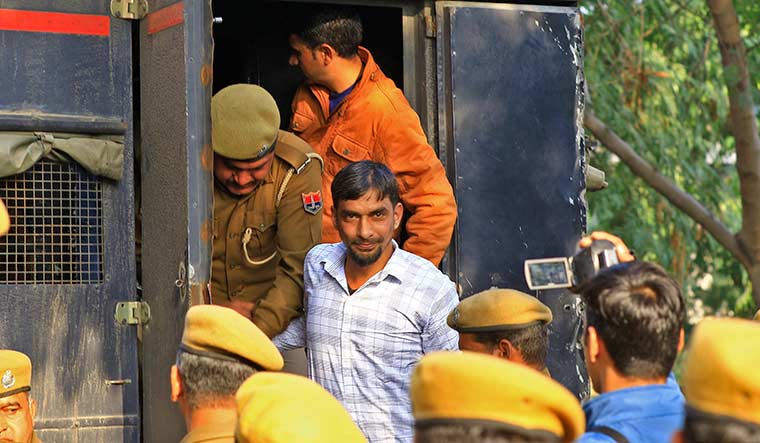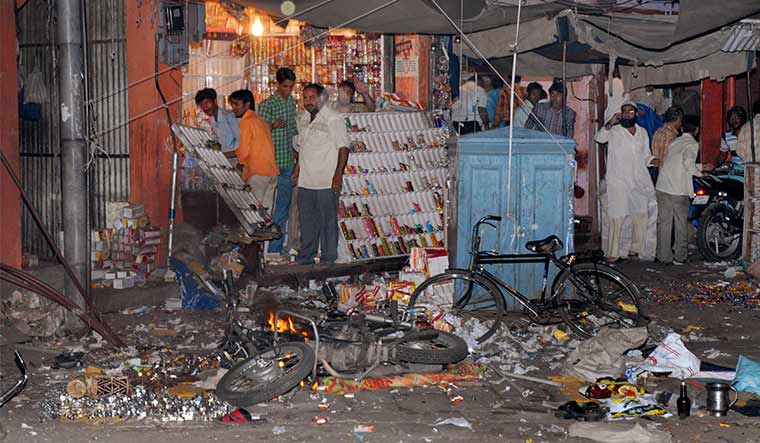NATWAR GOPAL MALPANI, 76, still remembers the horror of the Jaipur serial blasts in 2008. He and his wife, Bhagwati Devi, 54, had just become grandparents. Bhagwati was shopping at Johri Bazaar when the explosions happened, abruptly ending the new chapter in her life.
“A shrapnel hit her head and she fell; she writhed in pain for 45 minutes. I will get justice only when the perpetrators are meted out the same treatment for killing innocents,” said Malpani, who runs an import-export business.
He had one question for the police, courts and politicians: “Why do we give the terror-accused a long rope, allowing them to take advantage of the system and the loopholes in the investigation?”
Malpani wants the real perpetrators to face the noose. “If the four accused are not the actual culprits, then the police should tell us who carried out the terror attacks,” he said.
On March 30, the Rajasthan High Court acquitted all four accused in the 2008 Jaipur blasts case, pointing at “systemic failure” leading to “inadmissible evidence”, “ignoring material contradictions’’, and “not properly considering the legal provisions in the Indian Evidence Act, Information Technology Act and the Code of Criminal Procedure” to prove beyond reasonable doubt the involvement of the four terror accused in the dastardly terror attack that killed 71 people.
The trial court had earlier convicted the accused and sentenced them to death. Last February, they were also sentenced to death by a trial court in the 2008 Ahmedabad blasts case.
After the High Court verdict, the first salvo against Gehlot was fired by Sachin Pilot, his rival in the Congress. Pilot said the verdict called for “self-introspection” by home and law departments. Interestingly, Gehlot handles the home portfolio and his trusted aide Shanti Dhariwal is the law minister. The shoddy handling of the blasts case has also given ammunition to the BJP. With assembly polls in Rajasthan due in December, the BJP has accused the Congress of engaging in “appeasement politics”.
But amidst the political blame game, the bigger question is who planted the nine bombs at eight locations in Jaipur on May 13, 2008? Fifteen years later, there are more questions than answers.
 Elusive justice: The police producing the accused in court in Jaipur on December 20, 2019 | Getty Images
Elusive justice: The police producing the accused in court in Jaipur on December 20, 2019 | Getty Images
All four accused in the Jaipur case hail from Sanjarpur village in Uttar Pradesh’s Azamgarh district. Sanjarpur was a crucial link in Indian Mujahideen’s pan-India terror network that stretched from Bhatkal in Karnataka to Darbhanga in Bihar to pockets of Maharashtra and beyond. After the Delhi Police’s special cell carried out the Batla House encounter in 2008, several IM operatives were arrested from Sanjarpur.
The investigation into the Jaipur blasts began only after the Delhi police arrested Mohammed Saif from Batla House in Jamia Nagar in Delhi on September 19, 2008. In his statement to the Delhi Police in October, Saif is learnt to have named nine others who were allegedly involved in the Jaipur blasts.
IPS officer Sanjeev Kumar Yadav, former member of the Delhi Police’s special cell who was instrumental in nabbing nearly 50 IM operatives, said one of the first IM members to be arrested after the Batla House encounter was Mohammed Saif, one of the individuals acquitted in the Jaipur case. “Those who fled are likely to have been killed in Islamic State territory in Syria,” said Yadav. “Even if they are alive, their support base does not exist today.”
After the arrest of operatives and the dismantling of the IM organisation, the onus was on investigators and courts to deliver speedy justice.
“Investigation is a dynamic process,” said O.P. Singh, former director general of police in Uttar Pradesh. “With the passage of time, the evidence turns old, laws change and witnesses turn hostile. To simply blame the investigating agency without looking at the entire system after a decade will be immature.”
Singh said state police forces faced systemic constraints before 2008 when it came to investigating inter-state terror networks. The National Investigation Agency was set up only in the aftermath of the 26/11 attacks in Mumbai. Also, the Jaipur blasts happened before technological interventions improved the tools for carrying out investigations.
In its verdict, the Rajasthan High Court flayed the police for resting the case on “circumstantial evidence”. The fact that the cases of all the accused were interlinked, the prosecution failed to establish the links in the chain to bring home conviction of the accused.
Their acquittal has raised concerns among investigators about the fate of ongoing terror trials. While the state government has decided to appeal in the Supreme Court against the acquittal of the four accused, it is an uphill journey.
Investigators say there are links between the Jaipur case and the blasts in Faizabad in Uttar Pradesh in 2007. “The terror incidents of those times need to be read in their totality…. And any reflection on those incidents should be in the context of the availability of technology to investigate such cases in 2008,” Rajasthan ATS chief Ashok Rathore told THE WEEK. “These blasts were a sign of a larger conspiracy.’’
According to investigators, the accused visited Jaipur on May 11, 2008 to do a recce of the blast sites. On May 13, they came in groups by buses from Bikaner House in New Delhi using fake identities. After planting the bombs, they left Jaipur by Shatabdi Express train. None of the accused were believed to be carrying mobile phones that day. Saif is learnt to have told the Rajasthan police that he purchased a cycle from Anju cycle shop and identified the blast sites. These facts were apparently not in the knowledge of the investigation officer earlier.
The High Court also dug holes in the process of test identification parades of the accused conducted by magistrates in jail in the presence of the investigating officer. The police is countering the discrepancy citing the Rajasthan Police Rules, which do not bar the investigating officer from witnessing proceedings. The court has also rapped the police for errors in the bills given by the cycle shop-owners like different dates and cycle frame numbers. Whether these can be accepted as “human mistakes’’ remains to be seen when the state government appeals in the Supreme Court.
In Sanjarpur, Saif’s father Shadab Ahmad hopes that the acquittal in the Jaipur case can bring relief to his son, who is facing death sentence in the Ahmedabad blasts case. A father of ten, Shadab’s eldest son is Shahnawaz Alam, allegedly a top IM leader who joined the Islamic State in Syria in 2013-14.
Shadab said he would file an appeal against Saif’s death sentence in light of the acquittal in the Jaipur case. But, given the long legal processes involved, it is unlikely that he would get immediate relief. The victims of terror, meanwhile, await a closure that can bring a balance of justice to balm their wounds.


